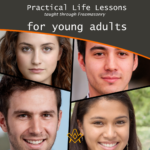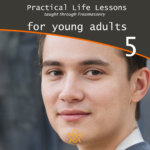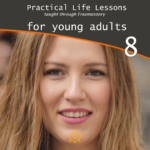A series of articles, produced by the square magazine, offering a guide to practical life lessons, taught through Freemasonry for young professionals, setting out in life after completing full time education.
Lesson 9 How to be a good partner and parent, if and when you decide to have a family.
Why it is important to be a good partner and parent, if and when you decide to have a family.
To provide a loving and supportive environment for the growth and development of the children:
Emotional Well-being: Children who grow up in a loving and supportive environment tend to have better emotional well-being. They feel secure, valued, and understood, which fosters self-confidence and resilience. This emotional foundation is crucial for navigating the challenges of life.
Cognitive Development: A supportive environment encourages curiosity and learning. When children feel safe and loved, they are more likely to explore, ask questions, and engage in educational activities. This promotes cognitive development and academic success.
Social Skills: Children learn about relationships and social interactions primarily from their family. A loving environment teaches them about cooperation, conflict resolution, and the importance of empathy, setting them up for successful interactions in the wider world.
To create a strong and healthy relationship with the partner, based on trust, respect, and mutual support:
Emotional Stability: A strong partnership provides emotional stability for both partners. It offers a safe space where both individuals can express their feelings, share their concerns, and seek comfort.
Shared Responsibilities: In a healthy relationship, partners collaborate and share responsibilities, from household chores to financial decisions. This mutual support ensures that the burdens of daily life are evenly distributed and less overwhelming.
Growth and Evolution: A relationship based on trust and respect allows both partners to grow and evolve. They challenge each other, offer constructive feedback, and celebrate each other’s successes, leading to personal and collective growth.
To set a positive example for the children, teaching them how to be responsible, empathetic, and respectful individuals in their own relationships:
Modeling Behavior: Children often emulate the behavior they observe at home. By being responsible, empathetic, and respectful, parents set a standard for how their children should behave in their own relationships.
Teaching Values: Through daily interactions, parents can instill important values in their children, such as honesty, kindness, and perseverance. These values guide children’s actions and decisions throughout their lives.
Preparing for the Future: By setting a positive example, parents prepare their children for future challenges. Children learn how to handle disagreements, how to communicate effectively, and how to prioritize the well-being of loved ones, ensuring they have the tools to build healthy relationships in adulthood.
In essence, being a good partner and parent not only benefits the immediate family unit but also has a lasting impact on the future generations, shaping the kind of individuals they become and the relationships they form.
How to be a good partner and parent, if and when you decide to have a family.
Being a good partner and parent requires a willingness to put in the time and effort to develop strong and healthy relationships. This means being open and honest with your partner, being a good listener, and showing empathy and understanding. It also means being willing to compromise and work together to solve problems and conflicts.
As a good parent, it is important to provide a loving and nurturing environment for your children. This means meeting their physical and emotional needs, setting boundaries and providing structure, and being a positive role model. It also means being involved in their lives and being there to support them as they grow and develop.
To be a good partner and parent, it is important to prioritize your relationships and make time for each other and for your family. This may mean setting aside specific times for date nights or family activities, and making an effort to stay connected even when you are busy. It is also important to be open and honest about your needs and expectations, and to communicate openly and effectively with your partner and children.
Additionally, being a good partner and parent means being willing to learn and grow, and to adapt to changes and challenges. This may mean seeking out resources and support, such as therapy or parenting classes, to help you navigate difficult situations and develop the skills you need to be a successful and loving partner and parent.
Overall, being a good partner and parent requires commitment, effort, and a willingness to put the needs of your family first. By focusing on building strong and healthy relationships, providing support and guidance, and being open and honest, you can be a loving and supportive partner and parent to your family.
Top Tips
1. Love and nurture your child unconditionally:
• Unwavering Support: Regardless of the circumstances, always be there for your child. Your unwavering support provides them with a sense of security and belonging.
• Acceptance: Embrace your child’s unique qualities and characteristics. Celebrate their achievements and support them through their challenges, ensuring they always feel valued.
2. Be a positive role model for your child:
• Lead by Example: Children often emulate their parents’ behavior. Displaying kindness, honesty, and integrity in your actions teaches them the importance of these values.
• Consistency: Be consistent in your actions and decisions, showing your child the importance of stability and reliability.
3. Communicate openly and honestly with your child:
• Active Listening: Pay attention to your child’s feelings and concerns. Listen actively and validate their emotions.
• Open Dialogue: Encourage open conversations, ensuring your child feels comfortable sharing their thoughts and feelings without fear of judgment.
4. Set boundaries and rules for your child to follow:
• Structure: Clear boundaries provide a sense of structure and predictability, helping children understand their limits.
• Consistent Enforcement: Consistently enforce rules, ensuring your child understands the consequences of their actions.
5. Encourage your child to be independent and make their own decisions:
• Problem-Solving: Allow your child to face challenges and find solutions, fostering critical thinking and decision-making skills.
• Trust: Show trust in your child’s abilities, boosting their confidence and self-esteem.
6. Show your child empathy and understanding:
• Validation: Acknowledge and validate your child’s feelings, teaching them the importance of empathy.
• Emotional Intelligence: Help your child recognize and understand their emotions, fostering emotional intelligence and self-awareness.
7. Foster a positive and supportive home environment:
• Harmony: Create a home environment where love, respect, and understanding prevail, ensuring your child feels safe and cherished.
• Encouragement: Celebrate your child’s achievements and encourage their passions, fostering a sense of self-worth.
8. Provide a safe and secure home for your child:
• Physical Safety: Ensure your home is free from hazards, and teach your child about safety precautions.
• Emotional Safety: Create an environment where your child feels emotionally secure, free from fear, and anxiety.
9. Teach your child about responsibility and accountability:
• Chores and Tasks: Assign age-appropriate chores, teaching your child the value of hard work and responsibility.
• Consequences: Help your child understand the consequences of their actions, fostering a sense of accountability.
10. Be patient and always remember that every child is different and will develop at their own pace:
• Individual Growth: Recognize that each child has their own growth trajectory. Celebrate their milestones, no matter when they occur.
• Adaptability: Be adaptable in your parenting approach, understanding that what works for one child might not work for another.
In essence, being a good parent involves a combination of love, understanding, guidance, and patience. It’s about creating a nurturing environment where your child feels valued and empowered to become the best version of themselves.
Full Series

Practical Life Lessons taught through Freemasonry
Learning and Development
A series of 10 learning and development articles, offering a guide to practical life lessons taught through Freemasonry for young adults setting out in life after full time education.
Overall, the lessons taught by Freemasonry are designed to help young adults develop the character, skills, and knowledge needed to succeed in life. By following the principles of brotherhood, charity, and self-improvement, young open minded individuals can build a strong foundation for a fulfilling and meaningful life.
The topics covered in the series are:
Lesson 1. How to communicate effectively and assertively.
Lesson 2. How to manage your finances and budget your money.
Lesson 3. How to take care of your physical and mental health.
Lesson 4. How to build and maintain healthy relationships.
Lesson 5. How to handle difficult emotions like anger, sadness, and fear.
Lesson 6. How to set and achieve goals for your personal and professional life.
Lesson 7. How to be open-minded and embrace diversity and inclusion.
Lesson 8. How to be a responsible and respectful member of your community.
Lesson 9. How to be a good partner and parent, if and when you decide to have a family.
Lesson 10. How to be adaptable and resilient in the face of challenges and change.
more ...
 Practical Life Lessons taught through Freemasonry - P1 A series of articles offering a guide to practical life lessons taught through Freemasonry for young adults setting out in life after full time education - Lesson 1; How to communicate effectively and assertively ? |
 Practical Life Lessons Taught Through Freemasonry - P2 A series of articles offering a guide to practical life lessons taught through Freemasonry for young adults setting out in life after full time education - Lesson 2: How to manage your finances and budget your money? |
 Practical Life Lessons Taught Through Freemasonry - P3 A series of articles offering a guide to practical life lessons taught through Freemasonry for young adults setting out in life after full time education - Lesson 3: How to take care of your physical and mental health |
 Practical Life Lessons taught through Freemasonry - P4 A series of articles offering a guide to practical life lessons taught through Freemasonry for young adults setting out in life after full time education - Lesson 4: How to build and maintain healthy relationships |
 Practical Life Lessons taught through Freemasonry - P5 A series of articles offering a guide to practical life lessons taught through Freemasonry for young adults setting out in life after full time education - Lesson 5: How to handle difficult emotions like anger, sadness, and fear |
 Practical Life Lessons taught through Freemasonry - P6 A series of articles offering a guide to practical life lessons taught through Freemasonry for young adults setting out in life after full time education - Lesson 6: How to set and achieve goals for your personal and professional life |
 Practical Life Lessons taught through Freemasonry - P7 A series of articles offering a guide to practical life lessons taught through Freemasonry for young adults setting out in life after full time education - Lesson 7: How to be open-minded and embrace diversity and inclusion for your personal and professional life |
 Practical Life Lessons taught through Freemasonry - P8 A series of articles offering a guide to practical life lessons taught through Freemasonry for young adults setting out in life after full time education - Lesson 8: How to emerge as a responsible and respectful member of your community inyour personal and professional life |
 Practical Life Lessons taught through Freemasonry - P9 A series of articles offering a guide to practical life lessons taught through Freemasonry for young adults setting out in life after full time education - Lesson 9: How to be a good partner and parent, if and when you decide to have a family. |
 Practical Life Lessons taught through Freemasonry - P10 A series of articles offering a guide to practical life lessons taught through Freemasonry for young adults setting out in life after full time education - Lesson 10. How to be adaptable and resilient in the face of challenges and change. |
masonic knowledge
to be a better citizen of the world
share the square with two brothers

click image to open email app on mobile device








